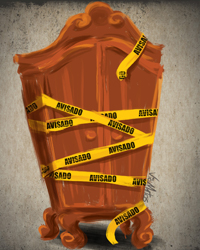Coming out of the closet may be becoming an increasingly less difficult step for gays living in large urban centers, but it is still far from being an easy experience. Who doesn't know a tragic story about a friend who came out to their parents and suffered a lot afterwards? These are not "just" reports of psychological aggression, no. There are reports of the most horrific mistreatment, involving everything from verbal attacks to physical attacks.
So many repeated experiences show that there is, within the LGBT community, a certain fear of coming out of the closet. And this fear, let's face it, is not unfounded.
According to the Homophobic Violence Report from the Special Secretariat for Human Rights of the Presidency of the Republic, 61,16% of victims of homophobia are between 15 and 29 years old, the age at which most people still live with their parents. The report also indicates that the majority of attacks took place inside the home (38,6% of cases). I mean, yes, we have reasons to worry when we decide to come out of the closet.
There is not only the fear of physical aggression, there is also the fear of financial abandonment and blackmail, after all, many children and adolescents, in addition to not wanting to lose their standard of living, are not even able to work to earn enough to live - and Nor should they have that kind of concern.
Sometimes gay children and teenagers can even be lucky enough to have welcoming parents. But what about those who are helpless? Can parents really do whatever they want without any punishment? Of course, the answer is no!
The Child and Adolescent Statute establishes, in its 3rd and 4th articles, that all children and adolescents are people worthy of rights and respect, and it is up to the family, society and the State to guarantee that they will be respected, being prohibited from all forms of discrimination (article 5).
This means that children and teenagers cannot be discriminated against by their parents. If they suffer any type of violence or threat (psychological, verbal or physical), they can contact the Child Protection Council in their neighborhood (click here to check the list of those that exist in São Paulo), which, in turn, must initiate an investigation into the matter. the complaint, with the help of the Public Prosecutor's Office. If the judge in the case understands that the child or adolescent is at risk in their biological family (i.e., where they were born), they (the child) may be removed from the same (biological family) and placed, through the Family Reception Program. , in a temporary family.
The idea is not to separate the family, but, above all, to guarantee that the child or adolescent will be safe from discrimination, until it is realized that there are conditions for their return home.
In the case of young people of legal age suffering blackmail from their parents (who say they will stop paying allowance, college, etc.), it is also possible to file a maintenance action, in which the judge forces the parents or guardians to pay a monthly pension . The amount will be set according to the person's proven needs and the parents' financial conditions.
A new feature is also compensation for emotional abandonment. If the father or mother abandons their son or daughter – as some parents do when their children come out of the closet – compensation may be charged. In 2012, for example, the Superior Court of Justice granted compensation in the amount of R$200.000,00 in a case in which a father abandoned his daughter materially and emotionally (Special Appeal 1.159.242/SP).
Of course, appealing to the law should never be your first option, but it is always important to know your rights. Parents – or legal guardians – do not own their children and, therefore, cannot act as they wish towards them, discriminating for example. A good conversation, with a lot of patience, can disarm them of all fears and prejudices. When dialogue fails, however, be sure to look for a lawyer.
Thales Coimbra is a lawyer specializing in LGBT law (OAB/SP 346.804); graduated from the Faculty of Law at USP, where he is currently pursuing a master's degree in the area of legal philosophy on homophobic hate speech; he also founded and currently coordinates Geds – Study Group on Law and Sexuality at the USP Law School; and writes biweekly about Rights on the portals A Capa and Gay Brasil. www.rosancoimbra.com.br/direitolgbt



